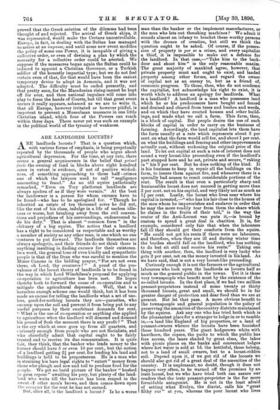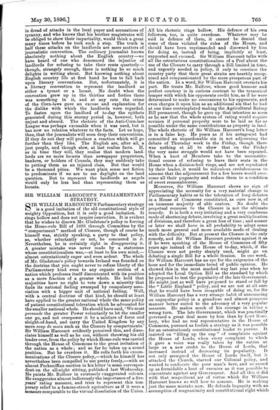ARE LANDLORDS LOCUSTS? A RE landlords locusts ? That is a
question which, with various forms of emphasis, is being perpetually repeated by the thousands of people who argue about agricultural depression. For the time, at any rate, there seems a general acquiescence in the belief that prinvi facie the owning of land in blocks above eight hundred acres in extent is evidence, if not of positive wicked- ness, of something approaching to those half - crimes one of which the lawyers used to call "negligence amounting to fraud." As an old squire pathetically remarked, "Even on Tory platforms landlords are always spoken of as if they were vermin." At the best the landowner is a person for whom excuses have to be found—who has to be apologised for. "Though he inherited an estate of ten thousand acres he did not, like the rest of his class, indulge in a life of useless idle- ness or worse, but breaking away from the evil conven- tions and prejudices of his surroundings, endeavoured to do his duty." That is almost "common form" in the obituary of a big squire. The notion that a landlord has a right to be considered as respectable and as worthy a member of society as any other man, is one which no one -ventures to put forward. The landlords themselves are always apologetic, and their friends do not think there is anything insulting in finding excuses for their existence. In a word, the general tone of even kindly and sympathetic people is that of the Dean who was careful to mention the Minor Canons in the bidding prayer, "For are not even -these, oh Lord, thy creatures ? " A proof of the pre- valence of the locust theory of landlords is to be found in the way in which Lord Winchilsea's proposal for applying co-operation to agriculture has been met. He hopes thereby both to forward the cause of co-operation and to mitigate the agricultural depression. Well, that is a "harmless enough scheme one would think, but it has been made an excuse for telling the landlords what a set of use- less, good-for-nothing locusts they are—parasites, who encamp upon the soil and prevent it from being put to any useful purposes by their exorbitant demands for rent. " What is the use of co-operation or anything else applied to agriculture when the landlord will descend and demand his pound of flesh the moment there is any profit ? " That is the cry which at once goes up from all quarters, and curiously enough from people who are not Socialists, and who cheerfully admit that capital ought to be fairly treated and to receive its due remuneration. It is quite fair, they think, that the banker who lends money to the farmer should have 5 or even 10 per cent., but the notion of a landlord getting 21 per cent, for lending his land and buildings is held to be preposterous. He is a man who is straining his bare legal rights to " extort " money from those who plough and sow and toil to produce food for the people. We get no lurid picture of the banker "hushed in grim repose" awaiting his prey, but plenty of the land- lord who waits till the harvest has been reaped in the sweat f other men's brows, and then comes down upon ilia occupier for the rent he has not earned. But, after all, is the landlord a locust ? Is he a worse man than the banker or the implement manufacturer, or the man who lets out threshing machines ? We admit it sounds almost an infamy to bracket these worthy persons with the drones of creation, but still we think the question ought to be asked. Of course, if the posses- sion of property is per se a crime, and every capitalist a thief, it is impossible to make out a defence for the landlord. In that case,—" Take him to the back- door and shoot him" is the only reasonable maxim. The great majority of mankind agree, however, that private property must and ought to exist, and landed property among other forms, and regard the owner of capital not as an enemy to, but as a friend of, economic progress. To those, then, who do not condemn the capitalist, but acknowledge his right to exist, it is worth while to address an apology for landlords. What is a landlord ? A landlord is a man who possesses land which he or his predecessors have bought and fenced and drained and cleared from trees and bushes and weeds, and on which they have erected houses and other build. ings, and made what we call a farm. This farm, then, is a block of capital. But people desire the use of such blocks of capital in order to carry on the business of farming. Accordingly, the land capitalist lets them have the farm usually at a rate which represents about 3 per cent, on what the farm would sell for, and about 1 per cent. on what the buildings and fencing and other improvements actually cost, without reckoning the original price of the land. To let out capital at such a rate of interest does not sound a very locust-like proceeding even if the landlord's part stopped here and he sat, private and secure, "raking in" his 3 per cent. But he does nothing of the kind. It is his business to keep in repair all the buildings on the farm, to insure them against fire, and whenever there is a specially bad season to remit considerable portions of the rent. The result is that even a particularly sharp and businesslike locust does not succeed in getting more than 2 per cent, net on his capital, and very likely not as much as per cent. Lastly, the locust who lives near where his capital is invested,—" who has his lair close to the homes of the men whom he impoverishes and enslaves in order that he may the more readily tear from them the share which he claims in the fruits of their toil," is the way the orator of the Anti-Locust van puts it,—is bound by custom to spend a great deal in charities. It is, for example, considered only fair that when the labourers fall ill they should get their comforts from the squire. "He could not get his rents if there were no labourers, and therefore, when they are ill and during winter time the burden should fall on the landlord, who has nothing to do but sit still and receive his rents." Taking one thing with another, then, the landlord is very lucky who gets 2 per cent. net on the money invested in his land. As we have said, that is not a very locust-like proceeding.
Curiously enough it is not the farmers or the agricultural labourers who look upon the landlords as locusts half so much as the general public in the towns. Yet it is these very townspeople who benefit most by the existence of the so-called locusts. In the first place, if we had two million peasant-proprietors instead of some twenty or thirty thousand locusts, great and small, we should be in far greater danger of protection and dear food than we are at present. But let that pass. A more obvious benefit to the townspeople and general population is the policy of preserving the amenities of the country districts maintained by the squires. Ask any one who has tried both which is the pleasantest place for a stranger to lodge in or to ramble in,—a land like England of big properties, or a land of peasant-owners whence the locusts have been banished these hundred years. The giant hedgerows white with hawthorn, the copses, the parks to which the public has free access, the lanes shaded by great elms, the lakes with picnic places on the banks and convenient lodges where hot water is sold at Id. the kettleful, these belong, not to a land of small owners, but to a locust-ridden soil. Depend upon it, if we got rid of the locusts we should also get rid of a great deal of the amenities of the country. It is unpleasant, no doubt, though it does not happen very often, to be warned off the premises by an irate locust, but we who have tried both can assure our readers that the irate peasant-proprietor is the far more formidable antagonist. He is not in the least afraid of setting what Evelyn, the diarist, calls his "great filthy cur" at you, whereas the poor locust who lives in dread of attacks in the local paper and accusations of tyranny, and who knows that his brother magistrates will be obliged to show their impartiality, would think a great many times before he took such a step. The truth is half these attacks on the landlords are mere matters of journalistic convention. The ordinary journalist knows absolutely nothing about the English country—we have heard of one who denounced the injustice of landlords for refusing to take their rents quarterly— though, strangely enough, there is nothing he so much delights in writing about. But knowing nothing about English country life at first hand he has to fall back upon literary conventions. But, unfortunately, it is a literary convention to represent the landlord as either a tyrant or a locust. No doubt when the convention grew up in the thirties and forties there was something in it, and at any rate the crime of the Corn-laws gave an excuse and explanation for the dislike with which the landlords were regarded. To fasten upon the landlord of to-day the epithets generated during this stormy period is, however, both unjust and absurd. The rhetoric of the Anti-Corn-law League was perhaps excusable when it was used, but it has now no relation whatever to the facts. Let us hope, then, that the journalists will soon drop their conventions. If they do not they will produce a reaction which will go further than they like. The English are, after all, a just people, and though slow, at last realise facts. If, as in time they will, they realise that modern land- lords are no more locusts than newspaper proprietors, bankers, or holders of Consols, they may suddenly take to petting them as an injured class. But that would be a thousand pities. We want plain sense not fiction to predominate if we are to see daylight on the land question. But to represent the landlords as angels would only be less bad than representing them as locusts.



































 Previous page
Previous page